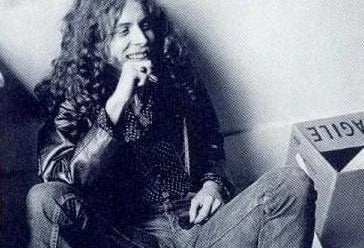When Twink, born John Charles Alder in November 1944 (and now known as Mohammed Abdullah) released his first solo album ‘Think Pink’ in December 1970 in the US (it was not released in the UK until early 1971), he had already been involved in music, in one way or another, for over a decade and a half. He came from a musical family, and by the mid 1950s, had been caught up in the ‘Skiffle’ craze before the first wave of rock and rollers swept all before them. Spooling forward to 1963, Alder was playing drums for Dane Stephens and the Deep Beats, who morphed into The Fairies by 1964. The band achieved a certain notoriety on the thriving British club circuit, and it was as a member of the band that Alder acquired the ‘Twink’ sobriquet, after the name of a brand of proprietary home perm solution!
The Fairies recording career was brief – consisting of three singles, one for Decca Records (‘Don’t Think Twice, It’s Alright’ (the Bob Dylan song) / ‘Anytime At All’), and two for HMV Records (‘Get Yourself Home’ / ‘I’ll Dance’, and ‘Don’t Mind’ / ‘Baby Don’t’), which failed to make much commercial headway.
After The Fairies split, Twink then moved on to proto Freak-Beaters The In Crowd, who featured future Yes lead guitarist, Steve Howe. As the Mod boom peaked, The In Crowd became the classic British Psychedelic combo, Tomorrow, featuring on vocals Keith West, and John ‘Junior’ Wood on bass guitar, in addition to Twink on drums and Howe on lead guitar. Despite releasing two of the era’s defining Psychedelic singles in 1967 with ‘My White Bicycle’ and ‘Revolution’, the band’s progress was hamstrung by the fact that their self-titled debut album didn’t get a release until February 1968 after the Flower Power charabanc had long since pulled out of the station, and, more injuriously, that West had scored a huge international smash hit single with the charming ‘Excerpt From A Teenage Opera’, better known as ‘Grocer Jack’, which blurred the focus of the band. The West single was produced, as was Tomorrow, by US ex-pat Mark Wirtz.
After Tomorrow split, Twink and Wood had a short-lived project called The Aquarian Age, releasing one single ’10,000 Words In a Cardboard Box’ / ‘Good Wizard Meets Naughty Wizard’, before Twink joined The Pretty Things, touring the UK and Europe, and playing on their epochal SF Sorrow album, in December 1968. He left the band soon after the departure of their founding guitarist, Dick Taylor in June 1969.
Twink began recording Think Pink whilst still a member of the Pretty Things, beginning with recording demos with the likes of Steve Peregrine Took (then a member of Tyrannosaurus Rex), and Junior Wood from Tomorrow. For the album sessions proper, he assembled a cast of musicians who were from the cutting edge of British rock and roll of the time. These included Deviants guitarist Paul Rudolph, who had a similar exploratory approach to guitar as, say, Fred ‘Sonic’ Smith of The MC5, drummer Viv Prince (like Twink, formerly of The Pretty Things), and current Pretty Things alumni Jon Povey (mellotron, sitar) and Wally Allen (keyboards), as well as Steve Peregrine Took on percussion and vocals. Notionally in the producer’s chair was Deviants main man Mick Farren.
The front cover image of Think Pink, designed by the Hipgnosis design lab, features an Autumnal photo, taken in Holland Park in London, and the season seems to inform some of the music on the album. Coming as the Psychedelic scene had burned itself out, the trips offered up by the sounds within are both good and bad.
Although, to contemporary ears, some of the albums’ tracks can meander and lose direction, there are moments where all snaps vividly into focus, and a more coherent vision slides into view. Some reviewers have retrospectively compared some elements of the album to be sonic precursors of Joy Division, some ten years later.
The album wasn’t a commercial success but it has picked up a growing currency, as successive generations of musicians and Psychedelic Rock fans have turned on to Think Pink’s lysergic charms. As a kind of ‘missing link’ between Tomorrow, The Pretty Things, The Deviants and the soon-to-be-convened Pink Fairies, it is a fascinating, allusive and colourful snapshot of an era that still exerts a palpable influential thumbprint.
With thanks to Alan Robinson

